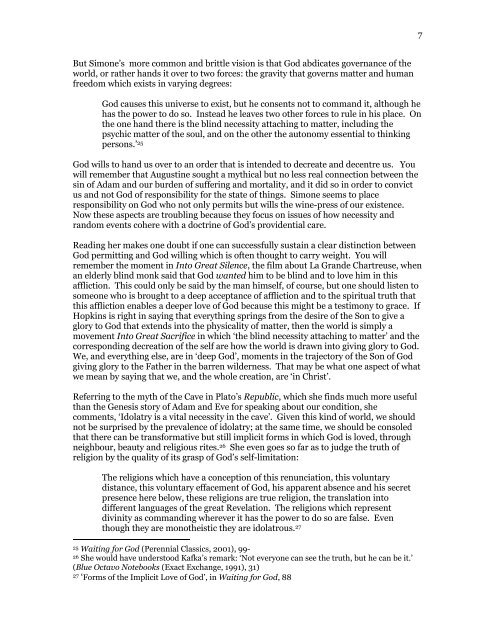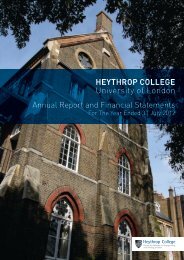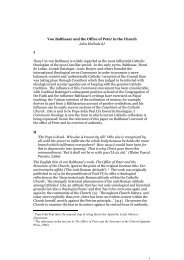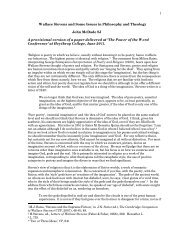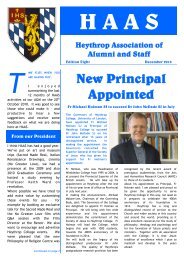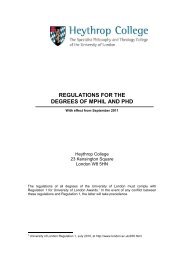Simone Weil: Affliction and Necessity
Simone Weil: Affliction and Necessity
Simone Weil: Affliction and Necessity
Create successful ePaper yourself
Turn your PDF publications into a flip-book with our unique Google optimized e-Paper software.
7But <strong>Simone</strong>‟s more common <strong>and</strong> brittle vision is that God abdicates governance of theworld, or rather h<strong>and</strong>s it over to two forces: the gravity that governs matter <strong>and</strong> humanfreedom which exists in varying degrees:God causes this universe to exist, but he consents not to comm<strong>and</strong> it, although hehas the power to do so. Instead he leaves two other forces to rule in his place. Onthe one h<strong>and</strong> there is the blind necessity attaching to matter, including thepsychic matter of the soul, <strong>and</strong> on the other the autonomy essential to thinkingpersons.‟ 25God wills to h<strong>and</strong> us over to an order that is intended to decreate <strong>and</strong> decentre us. Youwill remember that Augustine sought a mythical but no less real connection between thesin of Adam <strong>and</strong> our burden of suffering <strong>and</strong> mortality, <strong>and</strong> it did so in order to convictus <strong>and</strong> not God of responsibility for the state of things. <strong>Simone</strong> seems to placeresponsibility on God who not only permits but wills the wine-press of our existence.Now these aspects are troubling because they focus on issues of how necessity <strong>and</strong>r<strong>and</strong>om events cohere with a doctrine of God‟s providential care.Reading her makes one doubt if one can successfully sustain a clear distinction betweenGod permitting <strong>and</strong> God willing which is often thought to carry weight. You willremember the moment in Into Great Silence, the film about La Gr<strong>and</strong>e Chartreuse, whenan elderly blind monk said that God wanted him to be blind <strong>and</strong> to love him in thisaffliction. This could only be said by the man himself, of course, but one should listen tosomeone who is brought to a deep acceptance of affliction <strong>and</strong> to the spiritual truth thatthis affliction enables a deeper love of God because this might be a testimony to grace. IfHopkins is right in saying that everything springs from the desire of the Son to give aglory to God that extends into the physicality of matter, then the world is simply amovement Into Great Sacrifice in which „the blind necessity attaching to matter‟ <strong>and</strong> thecorresponding decreation of the self are how the world is drawn into giving glory to God.We, <strong>and</strong> everything else, are in „deep God‟, moments in the trajectory of the Son of Godgiving glory to the Father in the barren wilderness. That may be what one aspect of whatwe mean by saying that we, <strong>and</strong> the whole creation, are „in Christ‟.Referring to the myth of the Cave in Plato‟s Republic, which she finds much more usefulthan the Genesis story of Adam <strong>and</strong> Eve for speaking about our condition, shecomments, „Idolatry is a vital necessity in the cave‟. Given this kind of world, we shouldnot be surprised by the prevalence of idolatry; at the same time, we should be consoledthat there can be transformative but still implicit forms in which God is loved, throughneighbour, beauty <strong>and</strong> religious rites. 26 She even goes so far as to judge the truth ofreligion by the quality of its grasp of God‟s self-limitation:The religions which have a conception of this renunciation, this voluntarydistance, this voluntary effacement of God, his apparent absence <strong>and</strong> his secretpresence here below, these religions are true religion, the translation intodifferent languages of the great Revelation. The religions which representdivinity as comm<strong>and</strong>ing wherever it has the power to do so are false. Eventhough they are monotheistic they are idolatrous. 2725 Waiting for God (Perennial Classics, 2001), 99-26 She would have understood Kafka‟s remark: „Not everyone can see the truth, but he can be it.‟(Blue Octavo Notebooks (Exact Exchange, 1991), 31)27„Forms of the Implicit Love of God‟, in Waiting for God, 88


